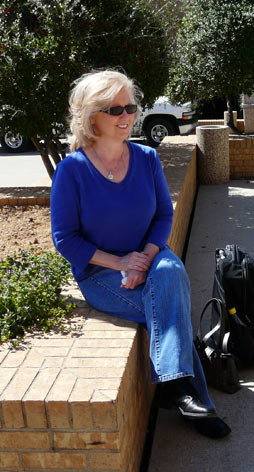By Rylie Parkins/ne news editor
(Part one in a four-part series on the turnover in jobs frequently held by students.)

Searching for a new job can be frustrating at times.
While there is an abundance of job opportunities, it can be difficult to decide which industry is the best fit.
Many people find child care to be an appealing career field, particularly working in day care centers.
However, the employee turnover rate in day care centers is extremely high because student employees hold many of the jobs, and they become dissatisfied and move from center to center.
Employee turnover in day-care centers has many causes.
Poor wages, poor manage-ment, unappreciative parents and rambunctious kids also play a significant role in why employees are so quick to quit their jobs.
“I believe the biggest reason for employee turnover in day cares comes from lack of support and training from the management staff,” Stephanie Barfknect, director and owner of Primrose School of The Mid-Cities, said.
“As a provider, supporting my staff with difficult issues, facilitating communication between families and teachers and giving my staff the tools to use in the classrooms are the most important issues I deal with on a daily basis,” she said.
Barfknect said employees need to know they are valued.
Lead and assistant teachers say they want that appreciation, too.
“I believe that the biggest reason for employee turnover in day cares is the lack of respect by directors for their teachers and also low pay,” Danielle Eddins, former Primrose Academy and Children’s Courtyard teacher, said.
Eddins said teachers love children and want to teach them new things and help them grow.
“A lot of directors take for granted the good teachers they have who work hard to teach well,” she said.
“They don’t reward them or give them the pay they deserve,” she said.
Amanda Metcalf, assistant teacher at Children’s Courtyard, expressed similar feelings.
“No matter how much you love the job that you do and you love the kids you work with, it’s sometimes so hard to go home at the end of the day feeling happy with how work went,” she said.
“There’s always someone that is unhappy with the way you’re doing your job.”
Another reason turnover is so high, these women said, is the amount of paperwork needed for each individual child and for the classroom.
“Day cares are more concerned with how the building looks than how well the children are taken care of,” Vicki Anders, lead teacher at Children’s Courtyard, said.
“There is so much paperwork to do that you almost don’t have time to play with the kids,” she said.
“We have three attendance sheets on each child daily we have to fill out,” she said.
Another reason day care employees may quit their jobs so frequently is unrealistic expecta-tions regarding management, parents and children.
Some employees, especially those who have no previous child care experience, often enter the field believing it will be an easy job.
Chelsea Watkins, who worked last summer at a child care center in Aledo, took the job thinking it would be easy work for good pay.
“I never realized how much is expected of you at a day care. I thought it would be like my baby-sitting jobs, but I was completely wrong,” she said.
“I quit after a month and went to another facility.”
Watkins, thinking that day care still was a great option for a job while she was in school on South Campus, took another job in Everman.
“There are so many restrictions in child care. Everyone is afraid of being sued, so we were always on alert. I decided to forget about day care,” she said.
“Now I work at Hobby Lobby, and I feel like I can get my work done with no hassles,” she said.
Watkins said her experience in two different child care facilities has turned her away from majoring in education. She has now decided on a degree in marketing.
“I know now that I don’t want to be a teacher and have to deal with all the issues of dealing with mean parents and bratty kids,” she said.
“It’s not for me.”
Amanda Williams, assistant teacher at Premier Academy, said many teachers enter the field without knowing what to expect and that day care workers are under valued.
“I think that’s when people start to leave,” she said.
“They realize it’s hard work because you can’t be the kids’ friend. You have to be the teacher, which means you have to discipline them,” she said.
Williams said it takes special people to be nurses, special people to be ER doctors and special people to work with the elderly every day.
“Don’t underestimate the special people it takes to work at a day care,” she said.

























